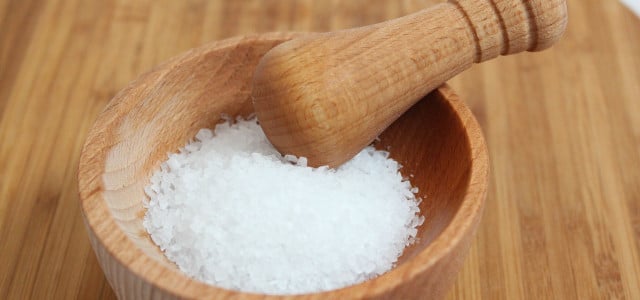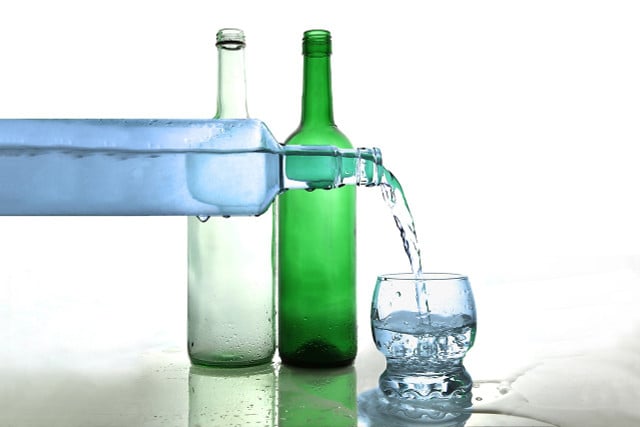
You shouldn’t underestimate a sodium deficiency, as it can have serious consequences. Here you can read how to correctly interpret the first signs and how to counteract them.
Sodium is one of the elements in the composition of table salt (chemical formula NaCl) and is therefore always available in sufficient quantities.
Nevertheless, under certain conditions, a sodium deficiency can occur in the body. This can lead to cramps and, in extreme cases, even coma. Athletes are often affected, but older people can also be at risk.
Sodium deficiency: The ratio in the body must be right

(Photo: CC0/pixabay/Studio-Fritz)
Sodium deficiency occurs when the concentration of dissolved sodium ions in the body is diluted. The medical portal Netdoktor explains that there are two possibilities for this:
-
Too much water: Doctors refer to this as a relative sodium deficiency. It occurs when you drink too much water.
-
Too little sodium: In this case there is an absolute sodium deficiency. This occurs rarely and is usually caused by illness.
The body reacts very sensitively to a sodium deficiency (Latin: hyponatremia). If you have too little of the element in your body, the brain first reacts with alarm signals and then the muscle cells cramp.
In the body, sodium is electrically charged, a so-called electrolyte. In order to transmit electrical impulses, sodium and water must be present in a certain ratio. Sodium is important for the functioning of nerves and muscles.
Sodium deficiency: Take the first symptoms seriously
If you suffer from a relative or absolute sodium deficiency, your body’s concentration of sodium is below the healthy level. Netdoktor lists the symptoms:
The first signs of a sodium deficiency are:
- malaise
- Headaches and muscle pain
- Nausea and vomiting
- Dizziness to slight confusion
- dizziness
The signs of severe cases of sodium deficiency are:
- Fluid accumulates in the brain and intracranial pressure increases.
- severe cramps
- Loss of consciousness and coma (life-threatening)
A blood analysis can clearly determine a sodium deficiency.
Relative sodium deficiency: athletes and the elderly are particularly at risk

(Photo: CC0/pixabay/ID 5239640)
Extreme athletes can suffer from a relative sodium deficiency. They drink a lot of fluids during training – sometimes too much at once. The athletes often misinterpret the first symptoms, such as headaches and muscle pain. They assume that they are dehydrated and drink even more water, which further increases the symptoms.
- According to the Ärzteblatt, marathon runners should drink little after a race. If symptoms of sodium deficiency occur, they can be treated with a saline solution.
- But it doesn’t have to be a marathon: Even if you go hiking in the summer or go to the sauna regularly, you can cause a sodium deficiency by drinking too much water.
Doctors advise listening to your own body: drink less after exercise and only as long as you feel thirsty.
Attention: If your symptoms do not subside, seek medical advice. Doctors can prescribe special saline solutions or restore balance in your body with a saline infusion.
In older people, kidney or heart disease or diabetes can sometimes lead to a sodium deficiency. The Pharmaceutical Journal reports that around five to ten percent of older people suffer from a sodium deficiency. Here too, some of the symptoms, such as tiredness and lack of concentration, are not attributed to a lack of the vital electrolyte.
Drinks can prevent but not cure sodium deficiency

(Photo: CC0/pixabay/rawpixel)
According to Ärzteblatt, isotonic drinks or sodium-rich mineral water are of little help in the case of an acute sodium deficiency. The concentration of sodium ions in the drink is usually too low to compensate for the deficiency in your body. Isotonic drinks are intended to quickly compensate for energy consumption after exercise. They contain energy sources such as glucose or fructose – but on average only 10 to 38 mmol/l of sodium. Netdoktor explains that the normal sodium level in the blood is between 135 and 145 mmol/l.
You can prevent sodium deficiency by being conscious of how much fluid you drink. Choose drinks that quench thirst quickly, such as:
- Water: You don’t necessarily need to buy mineral water with a high sodium content. Experts recommend simply dissolving a pinch of salt in the water. You can add a dash of lemon to make the drink even more delicious.
- You can also mix an apple juice spritzer with a pinch of salt.
Attention! Too much salt is unhealthy. The German Nutrition Society (DGE) recommends a daily allowance of table salt of around six grams or one teaspoon per day.
Netdoktor points out that sodium is often used as a preservative in dishes. As a result, the daily amount of sodium can often exceed the recommended amount by twice. An absolute sodium deficiency is therefore unlikely for a healthy person. The table salt in food is more than enough to cover the daily requirement of minerals.
Absolute sodium deficiency: These diseases can cause it

(Photo: CC0/pixabay/congerdesign)
A sodium deficiency can occur as a side effect of some diseases. Severe gastrointestinal diseases cause the body to lose not only fluids but also electrolytes, which include sodium. Infants and young children are particularly at risk.
Caution: If the infection lasts longer or is very severe, you should seek medical advice. In more severe cases of sodium deficiency, saline infusions must slowly bring the concentration back to normal levels.
Netdoktor lists, among others, these diseases that can cause a sodium deficiency.
- severe or extensive burns
- specific kidney diseases
- Inflammation of the pancreas or peritoneum
- Intestinal obstruction
But medications can also lead to a sodium deficiency:
- Dehydration tablets
- Medicines that lower blood pressure
- special antidepressants
- over-the-counter painkillers such as ibuprofen
Doctors recommend regular blood tests to check sodium levels. Older people in particular should have regular check-ups. Their bodies are particularly sensitive to changes in sodium levels in the blood.
Read more on Techzle\.com:
- Iron and iron deficiency: symptoms, nutritional tips and preparations
- Healthy eating: 10 nutrition myths
- Make your own protein bars: Vegan recipe for athletes
** marked with ** or orange underlined Links to sources are partly affiliate links: If you buy here, you are actively supporting Techzle\.com, because we then receive a small part of the sales proceeds. .